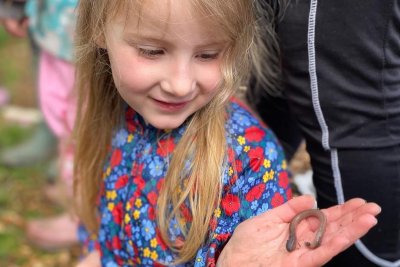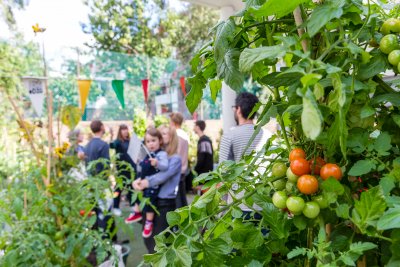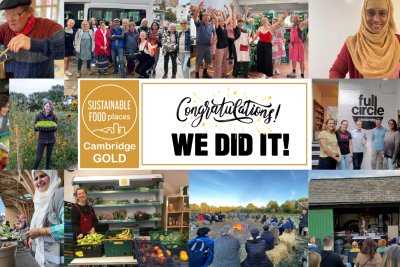Welsh veg for primary schools in Wales
How a pilot scheme in Cardiff shows potential to drive agroecological veg production through supply chain investment and public procurement, as part of their Food for the Planet campaign.

£84.8 million is spent on food in the Welsh public sector every year: a significant amount that could seed real change. It is likely that the Social Partnership and Public Procurement Bill will become law in Wales this year, imposing a duty on public sector organisations for procurement to be ‘socially responsible’ and enhance the well-being of the people of Wales.
Primary school children in Wales aren’t eating enough veg, and it would take just 2% of land in Wales to grow 5 a day for its entire population. So, there’s a clear opportunity to up the ‘social responsibility’ of procurement for school catering by increasing the amount of veg, grown sustainably in Wales, that makes it into children’s meals.
A partnership of organisations incuding Food Cardiff, Castell Howell and Blas Gwent together with the support of key partners, Cardiff Council, Cardiff and Vale University Health Board and Tyfu Cymru, decided to explore exactly what would be needed to make that happen.
So, in the summer of 2022, 29 schools in Cardiff took part in a 3 week Food and Fun programme, which saw nearly 1 tonne of locally, agroecologically grown courgettes make its way through the supply chain to feed almost 1,500 children.
This pilot has demonstrated that supplying Welsh agroecological veg into schools is possible, but not without the right investment into supply chains for agroecological produce.
Katie Palmer, Programme Manager at Food Sense Wales who commissioned this pilot as part of the organisation’s work with the Peas Please initiative, is now excited to see how this initial pilot could be scaled-up.
Katie says: “There is an opportunity to build on this pilot to see how a bigger and better sustainable supply chain investment scheme could work – something that’s needed if Welsh Government is to meet its commitment to increase the amount of locally produced food going into schools as part of their commitment to offer a free school meal to every primary school child by the end of 2024.
“Having seen the direct impact of this project, we’re now hoping to pilot a second phase working with additional Food Partnerships in different areas across Wales; with more producers; more variety of produce; more schools and children and more engagement.
"The commitment to get Welsh veg onto children’s plates would stay the same but we could work with more producers – looking at different varieties of veg; arranging farm visits, creating a longer pilot study working with more schools, co-working with catering staff and involving children in recipe design. It was so heartening to see the children engage with their food; connecting with where their food comes from, enjoying and discovering locally produced veg. We’re now really looking forward to progressing this study and scaling up this important work.”
Dr Amber Wheeler was commissioned by Food Sense Wales to carry out research alongside the pilot. Her report shows that if Welsh Government committed to every primary school meal containing two portions of vegetables in the next school year, that would require 5,331 tonnes of produce. If this was all agroecologically produced and from Wales, this would create a guaranteed market for Welsh agroecological producers of around £15 million. This would involve doubling the area growing field veg in Wales and would support around 100 businesses employing nearly 1,000 people.
The wider-reaching impact of this is that it would create a regionalised and resilient network of food producers that would be able to supply veg into the heart of their communities. The report recommends that, to make this a reality, we need a sustainable supply chain investment scheme that specifically targets the gap between cheapest available veg and sustainably produced Welsh veg.
“School meals provide an opportunity for agroecological veg producers and could stimulate investment in vegetable supply chains in Wales,” says Dr Amber Wheeler.
“Welsh Government is committed to improving the health of the nation and, as part of the Co-operation Agreement with Plaid Cymru, is rolling out free school meals to all primary school children in Wales by 2024. This provides a fantastic opportunity to provide nutritious meals to primary school children across the nation at the same time as potentially investing in sustainable Welsh production and supply chains.
“Establishing a sustainable supply chain investment scheme would result in the development of a network of food producers that would able to supply veg into the heart of their communities whilst delivering on Government’s local procurement and Net Zero commitments.
“But doing this would take a sustainable supply chain investment scheme that specifically targets the gap between cheapest available veg and sustainably produced Welsh veg,” adds Dr Wheeler. “A sustainable supply chain investment scheme could also be applied across other sectors, such as beef and lamb, which also could benefit more from public procurement markets if the cost differential were bridged.”
Read the report in Welsh here.
Read the report in English here.
Published Thursday 9 February 2023
Food for the Planet: Food for the Planet is helping local authorities, businesses and organisations take simple actions to tackle the climate and nature emergency through food.





